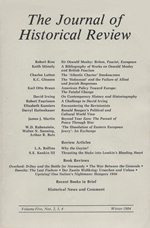Oswald Mosley Reconsidered
In the five years and twenty issues of its existence, this journal of contemporary history, devoted to the unusual and the unsung – to histories untold or told generally from only one point of view, to people and ideas, movements and events and interpretations not often given (so we from our perspective suppose) a fair…

